In mid-2014, I switched the bandwidth provider here in the Reinventorium from Eastlink to Bell Aliant.
While I’d previously been using an Apple AirPort Extreme wireless router hooked up to the Eastlink modem, I put this away in the cupboard when Bell Aliant installed a wireless-capable router — an Actiontec R1000H — as part of its service. Why complicate the setup, I reasoned, with possibly-dueling routers.
And things worked well, with bandwidth of 50 Mb/s down and 50 Mb/s up consistently since the original install.
Last week, though, I got a letter in the mail from Bell Aliant (curiously addressed to “Catherine Treasurer”) revealing that my (theoretical) 50/20 plan had been upgraded, at no additional cost, to a 100/50 plan; I saw no evidence of this in practice, however, with a Speed Test showing only 50/50:

I called Bell Aliant and asked them to check their modem, and they couldn’t find anything untoward, and so they scheduled a service call.
In the meantime, though, I wondered if it might be the wireless router, or my mid-2011 MacBook Air, that was the limiting factor, not the bandwidth into the office. So I plugged my MacBook directly into the Ethernet, and, presto, I was seeing much more bandwidth hardwired than I was seeing wirelessly.
I tried fiddling with the settings on the Actiontec R1000H to see if I could take advantage of heretofore-untapped capabilities of the router, but, try as I might, I couldn’t make it work any faster than 50/50.
So, on a lark, I took the old AirPort Extreme router out of the cupboard and set it up, plugging it directly into the Actiontec and creating 2.4 GHz and 5 GHz wireless networks.
On the 2.4 GHz AirPort network I got much the same throughput as with the Actiontec router; on the 5 GHz network, however, there was a dramatic uptick to 150/100, which is more than Bell Aliant tells me I should be getting (I’m not complaining):

So I’ve canceled the service call for Bell Aliant, and am now happily booting along the information superhighway with three times the horsepower.
Last last week Oliver and my mother and I visited the exhibit La bibliotheèque, la nuit — “The Library at Night” – at the Bibliothèque et Archives nationales du Québec in Montreal.
We weren’t really sure what we were in for, but the keywords “Alberto Manguel,” “Robert Lepage,” and “360° video immersion technology” were enough to get us to book tickets.
Which is how we ended up walking into a recreation of Manguel’s own library, set up in the basement of the Grand Bibliothèque downtown, on Friday afternoon at 4:30 p.m.
After an introductory exposition — in French, so the signal to noise ratio for us was low, but the general idea was “libraries are great!” – we were told to open the hinged benches we were sitting on and remove virtual reality headsets. These turned out to be Samsung Gear VR units, which are, in essence, a headset wrapped around a commodity Samsung mobile phone.
With some instructions on how to operate the headsets – again, in French, so we had to fumble along and then ask for help – another door opened and we were ushered into a simulated forest of birch trees, filled with solid tables and swivel chairs of the sort you would find in a well-outfitted old library. The lighting was subdued and the tone hushed and reverent.
And we were then left to our own devices to explore the virtual worlds that had been created for us, 10 libraries from around the world.
The UI of the headset was a little tricky to figure out, but eventually we did: we were presented with a series of icons, spread out at eye level inside a virtual representation of the same simulated birch forest we were actually sitting in (thus a virtual simulation of an analog simulation). Each icon represented a different significant library, some contemporary, like the Library of Congress in the USA and the Parliamentary Library in Ottawa, and some recreations of lost libraries, like the Library of Alexandria. To visit one of the libraries you simply stared at the icon long enough and were then transported there, into the middle of a scene playing out around you – all around you, in 360 degrees.
The quality of the virtual reality was awe-inspiring: there was no lag as I moved my head around: I looked up, and there was the ceiling; I looked down, and there was the floor (only that my feet weren’t there, which was the only disconcerting aspect of the constructed reality). People moved about. Things burned down. Someone played the cello. It was the first demonstration I’d ever had that it was worth donning a clunky, ugly set of head-goggles to experience, in a surprisingly visceral way, another place and time.
We spent about an hour wandering about the libraries of the world: the narration of each library, which played along as one moved about, was helpful. I learned about the destruction of the National Library in Sarajevo, the whale skeleton that forms the spine of the Biblioteca Vasconcelos in Mexico City, the copy of Birds of America at the heart of the Parliamentary Library collection in Ottawa. I missed one of the ten recreations, a fictional “Nautilus library” from Jules Verne, but I found my way to the other nine.
It was an enjoyable, revelatory, educational experience, a rare piece of evidence that digital technology affords opportunities that analog technology could not, in any way, reproduce. That it was done with a sense of flair and theatricality, and in the heart of a lovely library itself, was even better.
The exhibition runs through August 2016, so you have plenty of time to plan a visit.
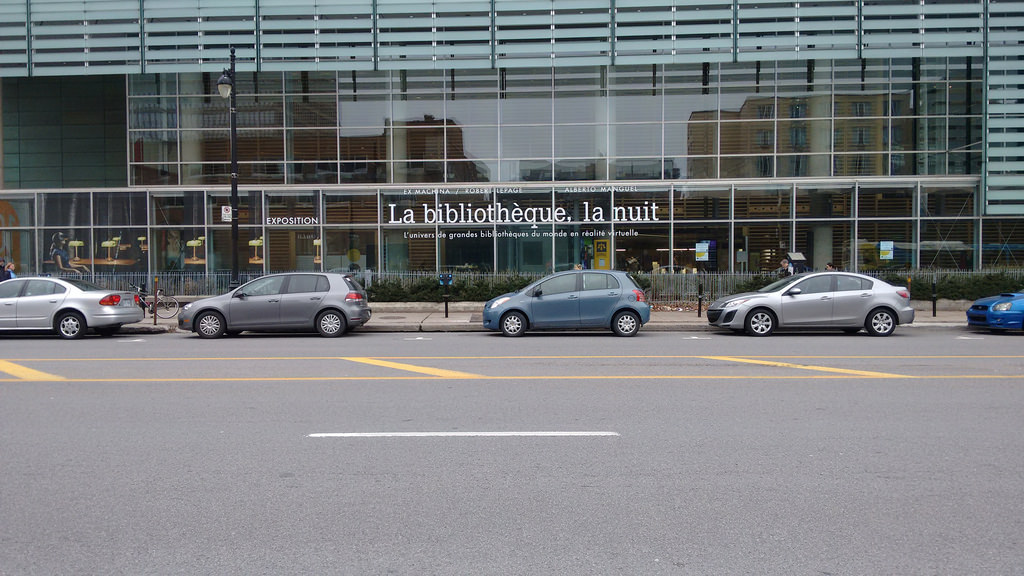
We’ve been traveling in airplanes with Oliver since he was 2 months old. He loves to travel, is comfortable in different places — sleeping, eating, exploring — and travel is one of the defining shared experiences of our family life and of Oliver’s education.
In recent years, though, the airport security screening experience has become a trigger for him, causing extreme anxiety and, a lot of the time, a meltdown that’s out of his control. It’s made travel more stressful for him, and for us.
The key issue has been that Oliver has had to go through the scanner by himself, leaving him across a great divide, in stressful, noisy, chaotic environments, from me or from Catherine. “Lost and lonely,” he describes it. Every new experience became worse because of the memory of all that which had come before.
We didn’t really know what to do, except to grin and bear it and try and get everyone calmed down as quickly as we could.
And then Ethan came into our lives.
And all of a sudden we started getting invited into “special services” security lines. They were still hell to pass through, but at least the lead-up to hell was abbreviated.
And then, during a particularly stressful, noisy and chaotic passage through Heathrow this October, a kind security officer said “would you prefer a manual search?”
“Yes!”, Catherine and I replied in unison.
We were ushered far away from the madding crowd into a quiet room with two friendly agents who did a manual physical search of Oliver and Ethan. It was calm. They were patient and communicated directly with Oliver. It was a very positive experience.
And so, on this weekend’s trip to Montreal, we resolved that was the way we were going to fly. We were bolstered by the helpful CATSA website Special Needs section that reads, in part:
Passengers with developmental or intellectual disabilities such as autism or Alzheimer’s disease can be screened without being separated from their traveling companions. If you need assistance, please inform the screening officer when you arrive at the checkpoint.
And so, passing through Charlottetown Airport on Thursday I simply told the officer “this is Oliver, he’s on the autism spectrum; we’ll need to stay together and he’ll need a manual search.”
They readily agreed, and forthwith Jeremy, who would be searching Oliver, invited me to walk through the screening machine while Oliver walked through beside and around with Ethan in-hand. He then went through a careful physical search of Oliver, communicating as he went through every step, working hard to respect Oliver and to establish trust. It was a dream compared to what we were used to. Oliver was happy. I was happy. Wow.
And tonight, heading back home through Montreal’s airport, we did the same thing. Here we had the added benefit of a special services security gate, so we were saved the wait and, again, I simply asked for a manual search and that we stay together. And, again, after a brief wait we were both guided around the screening machine; Oliver was searched by an officer with skills the equal of Jeremy’s, and then given a place to sit with Ethan while I went through a search. And, again, no stress. Happy travelers.
I wish someone had told us years ago that such an approach was possible, as it would have saved many, many stressful episodes – The Great Tokyo Meltdown of 2013 comes to mind.
And so I write this with the hopes that other travel companions of those on the autism spectrum might find it while Googling for a lifeline.
Oliver was watching over my shoulder as I wrote this post, and signed off on (and corrected spelling and grammar!) everything I wrote about him.
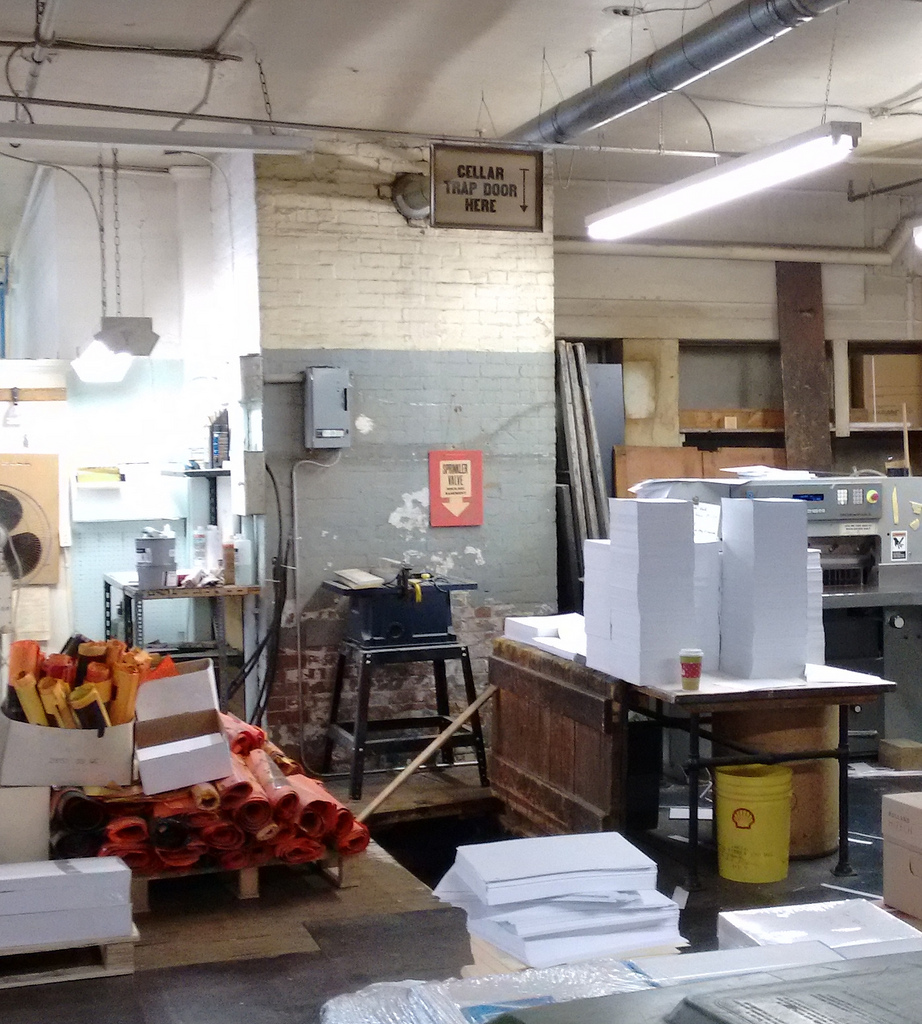
At the Lovell Litho & Publications plant in Montreal, home of the Musée de l’imprimerie du Québec.
In a laudable effort toward transparency and open data, the Office of the Third Party (the name bestowed on the Green Party in the Legislative Assembly) has released its expenses in comma-delimited ASCII format. In a blog post about the release, leader Peter Bevan-Baker requested feedback about the release and it seems only appropriate to provide the feedback in the open as well.
Format
The CSV file of the expenses appears to be simple a CSV export of the same spreadsheet used to generate the PDF file of the expenses, and as such it’s intended for human consumption not machine consumption.
Given that one of the benefits offered by open data is new opportunities for data visualization and analysis, machine readability generally trumps human readability (the PDF is fine for humans).
For example, if I wanted to track the expenses over the long term myself, to support longer-term analysis, the first thing I would do is to store them in a database. And to store them in a database in the current form would mean stripping out all of titles and subtitles, subtotals and grand totals intended for humans.
I would also need to convert the “amount” column to be simple decimal numbers, removing the “C$” from each figure so that these figures could be represented as numbers.
The result would look like this (visualized in a spreadsheet):
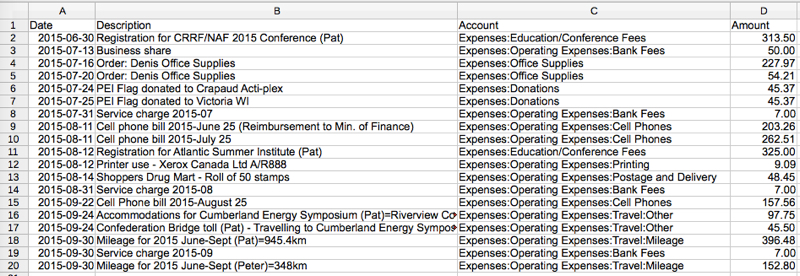
In this more machine-friendly format, I could simply import the CSV file directly into a database with no additional effort required.
Abbreviations, First Names and Context
What’s the CRRF-NAF 2015 Conference? Who is Pat? Who is Peter? What is the WI (I know the answer, but does everyone? Will people know in 50 years?)
Using acronyms that aren’t generally understood, or only first names, means some of the meaning is lost. Spelling things out ensures everyone can understand, now and in the future.
Why did Pat go go the Cumberland Energy Symposium? And to the CRRF/NAF Conference and the Atlantic Summer Institute?
I don’t doubt that there are good reasons for all three, but it would be nice to know the context for expenses like this, even if it’s just a simple sentence like “Supporting the leader’s work on local energy independence.”
Why are the cell phone bills sometimes more than $200 a month when all-you-can-use cell phone plans are available for less than $60 a month. Maybe there’s a good reason for this; I don’t know (maybe there’s more than one phone? maybe they need to shop around for a better plan?). Explaining expenses that might appear unusual to the lay reader can head off misunderstandings. And, again, it adds helpful context.
Many of these issues can be solved simply by elaboration of the data already there — spelling out abbreviations, adding last names and titles — and in other cases it might be useful to accompany the data with a set of explanatory notes that would add context (explaining conferences, cell phone plans, bank charges, etc.)
Hosting and Preservation
The release of the expenses was done through Peter Bevan-Baker’s own website. I would prefer to find the information under the Office of the Third Party website; I would expect the information there would have a better chance of being archived as part of the records of the Assembly than it would on Peter’s own website. It would also benefit being exposes to the Legislative Assembly’s search feature.
In any case, ensuring there’s a plan for long term preservation of the data is important.
Kudos
This is a great step forward, and my commentary above is offered in the spirit of “yes, and…” only. I hope the other parties quickly follow suit, and that this results in a sort of “openness arms race” where each tries to best the others in the degree of clarity, context and transparency offered to the public as spending of public funds is reported on.
This is the January 1, 2016 schedule.
Maybe you’re looking for the 2017 Levee Schedule?
This is the 2016 levee schedule for New Years Day, January 1, 2016 for Charlottetown, Prince Edward Island and area.
This is the 11th year I’ve been collating and confirming this information. If you’re new to all of this and want to give it a try, read How to Levee.
If you have additional levees to add, or changes to the information below, please drop me a line.
| Organization | Location | Starts | Ends | ♿ Accessible |
|---|---|---|---|---|
| Campbell Webster | 154 Great George Street, Charlottetown, PE | 9:00 AM | 10:00 AM | Yes |
| Lieutenant Governor | 1 Terry Fox Drive, Charlottetown, PE | 10:00 AM | 11:30 AM | Yes |
| Mayor of Charlottetown | 99 Queen St, Charlottetown, PE | 10:30 AM | 12:00 PM | Yes |
| PEI Women’s Institute | 420 University Ave, Charlottetown | 10:30 AM | 12:00 PM | Yes |
| Upstreet Craft Brewing | 41 Allen St, Charlottetown, PE | 10:30 AM | 12:30 PM | Yes |
| Canoe Cove Community Association | 1066 Canoe Cove Road, Canoe Cove, PE | 11:00 AM | 1:00 PM | Yes |
| Mayor of Borden-Carleton | 167 Industrial Drive, Borden-Carleton, PE | 11:00 AM | 1:00 PM | Yes |
| The Guild / Discover Charlottetown | 111 Queen Street, Charlottetown, PE | 11:00 AM | 1:00 PM | Yes |
| The Haviland Club | 2 Haviland St, Charlottetown, PE | 11:00 AM | 1:00 PM | Yes |
| University of PEI | 550 University Ave., Charlottetown, PE | 11:30 AM | 1:00 PM | Yes |
| Prince Edward Island Regiment | 3 Haviland Street, Charlottetown, PE | 12:00 PM | 1:00 PM | Yes |
| Mayor of Kensington | 30 Garden Drive, Kensington, PE | 12:00 PM | 1:30 PM | Yes |
| Town of Stratford | 234 Shakespeare Dr., Stratford, PE | 12:00 PM | 1:30 PM | Yes |
| PEI Brewing Company | 96 Kensington Road, Charlottetown, PE | 12:00 PM | 2:00 PM | Yes |
| Seniors Active Living Centre | 550 University Avenue, Charlottetown, PE | 12:30 PM | 2:00 PM | Yes |
| City of Summerside | 275 Fitzroy Street, Summerside, PE | 1:00 PM | 2:30 PM | Yes |
| St. John’s Lodge No. 1 and Victoria Lodge No. 2 | 204 Hillsborough St., Charlottetown, PE | 1:00 PM | 2:30 PM | No |
| Andrews of Stratford | 355 Shakespeare Drive, Stratford, PE | 1:00 PM | 3:00 PM | Yes |
| Roman Catholic Diocese of Charlottetown | 45 Great George Street, Charlottetown, PE | 1:30 PM | 2:30 PM | Yes |
| Town of Cornwall | 39 Lowther Drive, Cornwall, PE | 1:30 PM | 3:00 PM | Yes |
| Garden Home | 310 North River Road, Charlottetown, PE | 2:00 PM | 3:00 PM | Yes |
| Royal Canadian Legion | 99 Pownal Street, Charlottetown, PE | 2:00 PM | 3:00 PM | Yes |
| The Kitchen Witch | 949 Long River Road, Long River, PE | 2:30 PM | 4:30 PM | Yes |
| Benevolent Irish Society | 582 North River Road, Charlottetown, PE | 3:00 PM | 5:00 PM | Yes |
| Premier Wade MacLauchlan | 145 Richmond St, Charlottetown, PE | 3:00 PM | 5:00 PM | Yes |
| Charlottetown Curling Club | 241 Euston St, Charlottetown, PE | 4:00 PM | 6:00 PM | No |
| Murphy’s Community Centre | 200 Richmond Street, Charlottetown, PE | 4:00 PM | 6:00 PM | Yes |
| Sport Page Club | 236 Kent St, Charlottetown, PE | 4:00 PM | 6:00 PM | No |
Changes from 2015
- Table now includes accessibility information.
- New levee at Andrews of Stratford.
- New levee at Upstreet Craft Brewing (well-timed for an uptown swing to UPEI and the Women’s Institute).
- New levee from Discover Charlottetown and The Guild.
- There is no levee at HMCS Queen Charlotte this year.
- Added the levee for The Kitchen Witch. Not technically in the “Charlottetown Area,” but included nonetheless.
- The Premier’s Levee returns to the Confederation Centre of the Arts.
- In a stunning blow to the “Charlottetown area” in the title of this post, I’ve added the City of Summerside levee for this first time. Welcome, western neighbours.
- Now that Summerside’s on the list, seems only right to add Borden-Carleton. And Kensington.
The code that generates all of the above is available on Github.
License
Like the rest of this website, the levee schedule covered under a Creative Commons Attribution, NonCommercial, ShareAlike License. That means that you’re free to copy the data, publish the data, mash up the data, share the data, but that you must provide a credit to the source, like:
Schedule data from ruk.ca/levee-2016 under a Creative Commons Attribution, NonCommercial, ShareAlike License.
You’re encouraged to spread the information here as far and as wide as possible.
Today was the day to overprint TERMS OF UNION in black over the red Prince Edward Island. See also Five Islands.
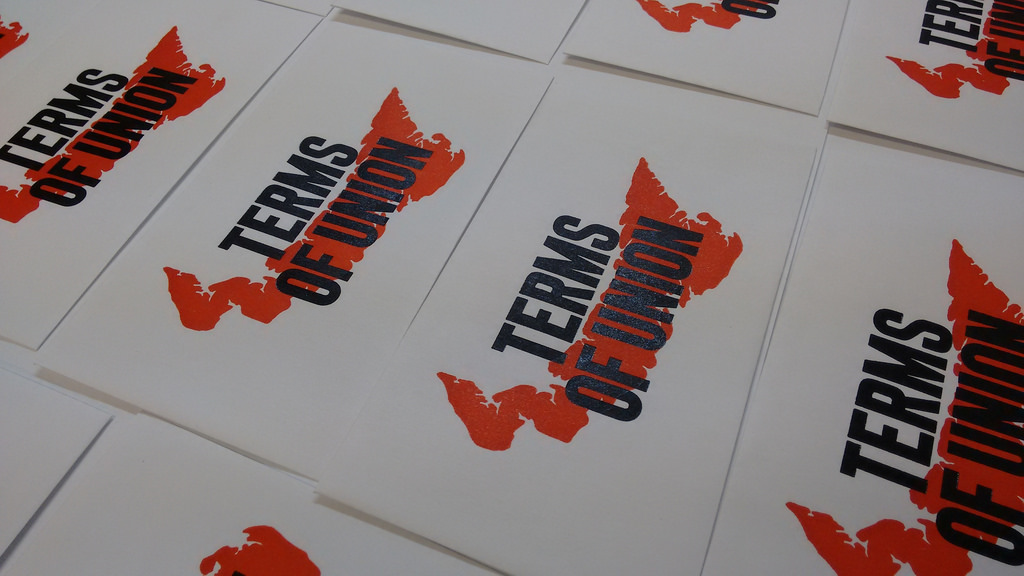
I’m in the final stages (I hope) of a year-long project to produce sets of Prince Edward Island “Terms of Union Flash Cards.” Today was the day to start printing the envelopes. I started out with too much ink on the rollers for my own good, and so in an effort to keep things moving along, I did some experimenting. This may be the favourite accidental experiment I’ve ever produced.

Here’s what the envelopes looked like once I’d got things going (they’ll get overprinted with black text in the next step):
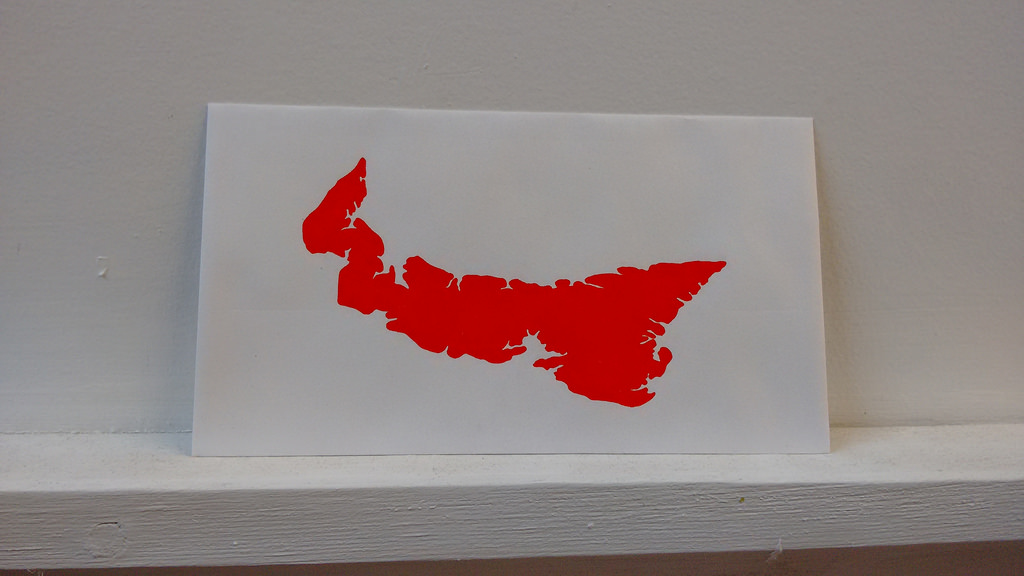
And here’s the letterpress cut – a loan from Ian Scott and Daphne Large – that made it all possible:

I really, really like Lumi, a company offering small runs of things like screen printing kits and vinyl decals from your own artwork. To try its services out, I prepared a vector version of the Reinvented logo and used Lumi’s remarkably simply web tool to upload it and select products to order (I ordered a vinyl decal and a screen print kit; total price $26.60 US).
Fifteen days after I ordered, the package arrived here in Charlottetown.
Lumi really needs to update its packaging game; my shipment was packed in a thin cardboard envelope that was twice as large as it needed to be and had been folded over double by the post office; the screen print ink in the package had started to leak a little. That all said, the decal and screen arrived intact and ready for use.
Here’s the vinyl decal before installation:
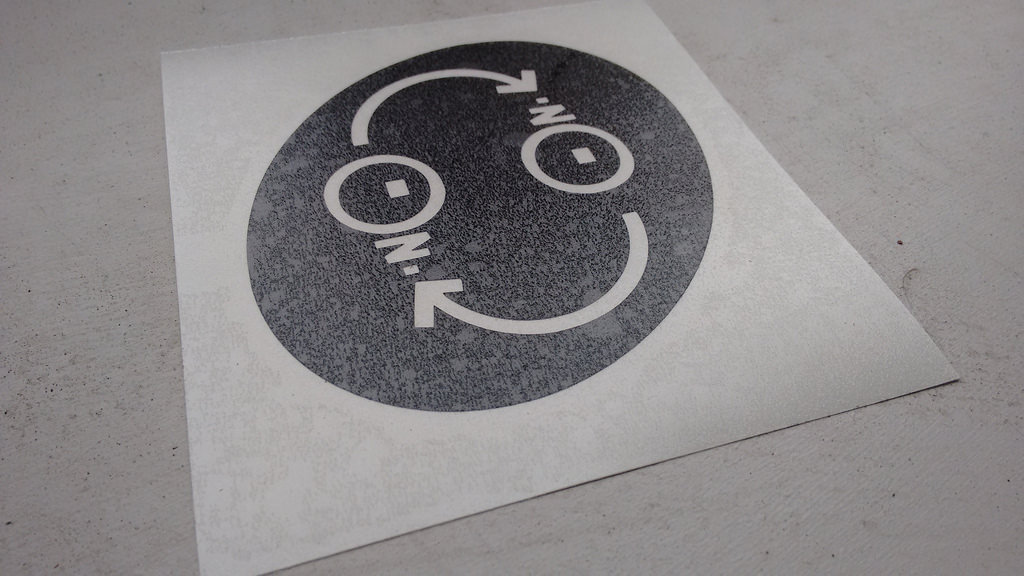
And here’s the vinyl decal installed on the door of the Reinventorium:
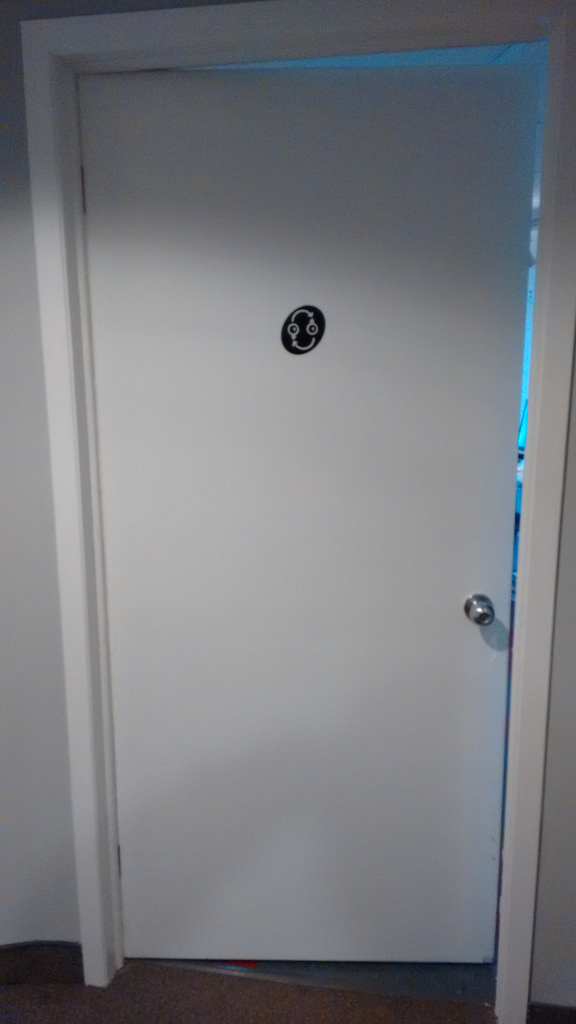
It was very easy to install, especially as a the kit included a squeegee. Lumi’s guide to decal installation was helpful, especially the caution to be careful when removing the transfer sheet (Reinvented almost lost an eyeball, but I used the aforementioned caution and avoided this).
About a year ago the Restore an Acre initiative of the Macphail Woods Ecological Forestry Project came to my attention. There was something about its simple, direct, well-executed approach to forest restoration that struck a chord with me, and so I became a supporter, making a $200 donation, in honour of former PEI premier Alex B. Campbell, who had been much on my mind last fall.
This weekend there was a walk through the forest that’s being restored – the Selkirk Road Public Forest – led by the project’s personable and enthusiastic leader Gary Schneider.
It was a damp, overcast afternoon, but a sizeable crowd of Restore an Acre supporters turned out and, over the course of three hours we headed from the Selkirk Road entrance deep into the woods, passing from the formerly-farmed front section into the sections at the rear that, among other things, sport large hemlock trees that, if you’re not used to them, seem completely out of place on Prince Edward Island.
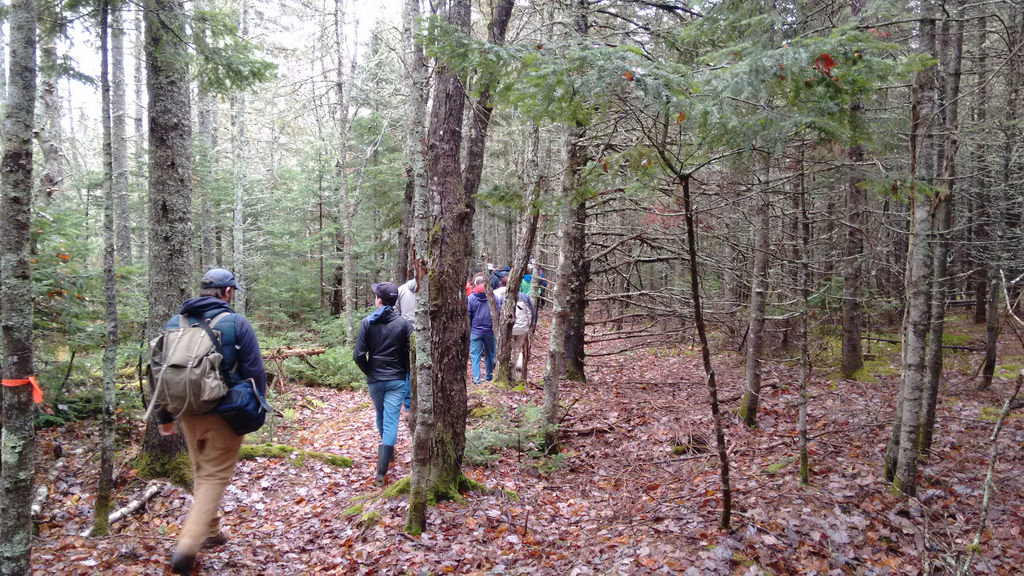
Never missing an opportunity to map a new part of Prince Edward Island, I had GPS Logger running on my Android phone during the walk, and yesterday I turned the traces I’d gathered, along with data traced from the satellite view, into OpenStreetMap. There’s still some fine-tuning and enhancement to do, but here’s what the map looks like after my update:
The Selkirk Road is well-known to many Islanders as the fast run from Charlottetown to the Wood Island Ferry. Next time you’re heading to or from the ferry and you’re in need of a walk in the woods, I encourage you to take a hike through these woods. And, of course, there are still acres waiting to be restored.
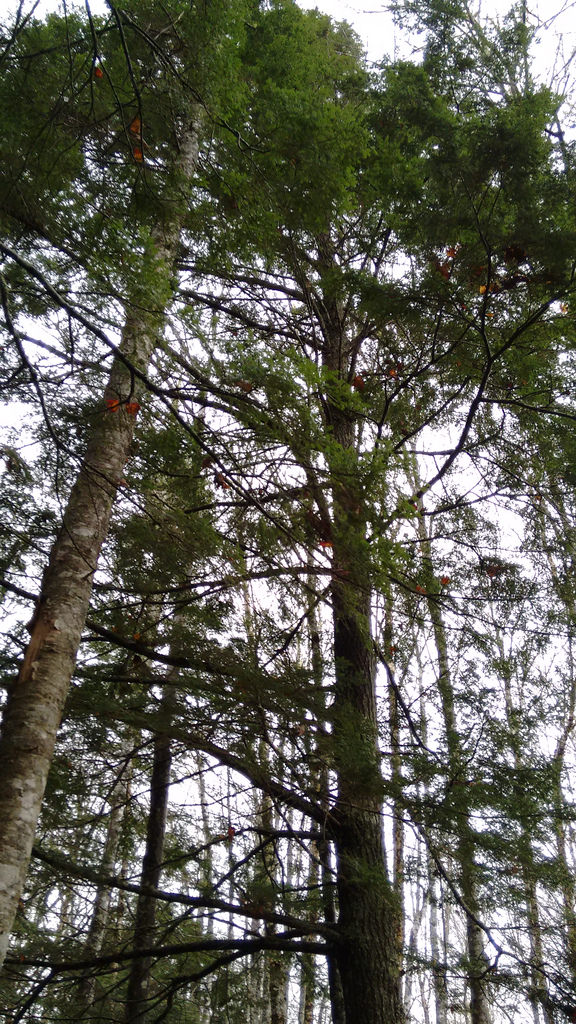
 I am
I am